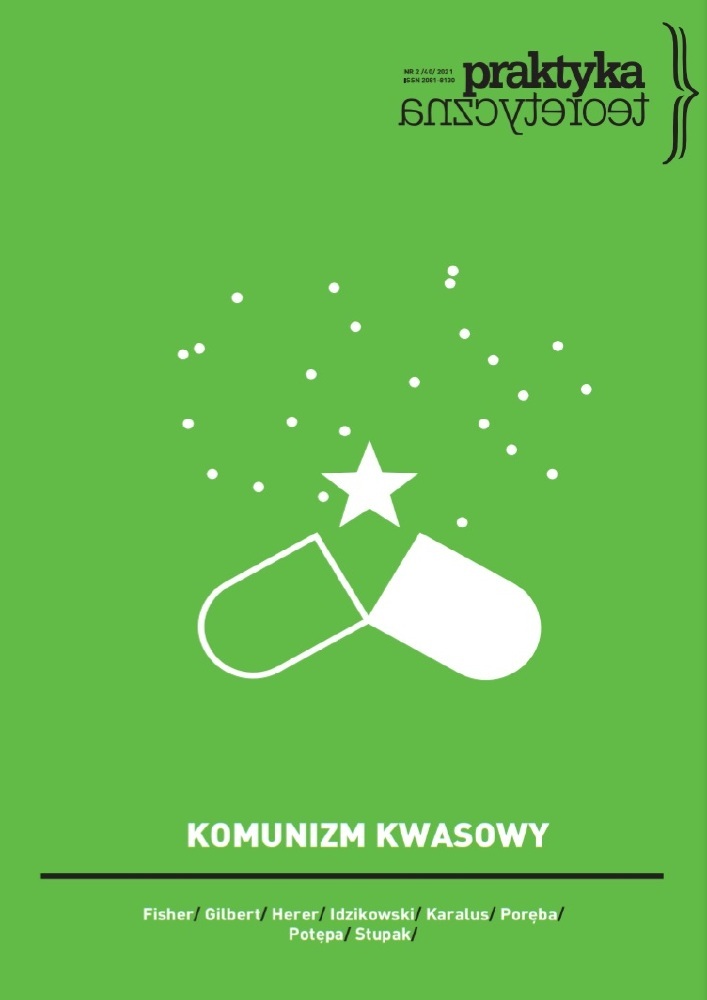Abstract
The article proposes an analysis of the encounter between Merry Pranksters and Hell’s Angels that took place in the mid-sixties in California. The objective was to understand the complex and ambiguous logic and dynamics of that encounter: from the first contacts to a temporary alliance, built mostly during the joint LSD parties, and the final conflict that had also its political expression. The events described have been put in the wider context of the rise and fall of the American counterculture and yet presented basically in their singularity. Main points of reference were the writings of Hunter S. Thompson and Tom Wolfe.
References
Adorno, Theodor W. 2010. Osobowość autorytarna. Tłum. Marcin Pańków. Warszawa: Wydawnictwo Naukowe PWN.
Barger, Ralph, Keith Zimmerman, i Kent Zimmerman. 2016. Hell’s Angel: Życie i czasy Sonny’ego Bargera i klubu motocyklowego Hell’s Angels. Tłum. Bogusław Lubański. Poznań: Karga.
Deleuze, Gilles, i Félix Guattari. 2017. Anty-Edyp. Kapitalizm i schizofrenia, t. 1. Tłum. Tomasz Kaszubski. Warszawa: Wydawnictwo Krytyki Politycznej.
Ginsberg, Allen. 2015. “Poetry, Violence, and the Trembling Lambs.” W The Essential Ginsberg, red. Michael Schumacher. New York: Harper Perennial.
Kesey, Ken. 2014. “The Fresh Air Interview.” W Conversations with Ken Kesey, red. Scott F. Parker. Jackson: University Press of Mississippi.
Leary, Timothy, Ralph Metzner, i Richard Alpert. 2011. Doświadczenie psychodeliczne. Tłum. Dariusz Misuina. Warszawa: Okultura.
Theweleit, Klaus. 2015. Męskie fantazje. Tłum. Michał Herer i Mateusz Falkowski. Warszawa: Wydawnictwo Naukowe PWN.
Thompson, Hunter S. 2003. “Freak Power in the Rockies.” W Thompson Hunter S. The Great Shark Hunt. Gonzo Papers. Vol. 1. New York: Simon & Schuster.
Thompson, Hunter S. 2008. Lęk i odraza w Las Vegas. Szaleńcza podróż do serca „Amerykańskiego snu”. Tłum. Marcin Wróbel i Maciej Potulny. Warszawa: Niebieska Studnia.
Thompson, Hunter S. 2016. Hell’s Angels. Anioły Piekieł. Tłum. Jarosław Pypno i Radosław Pisula. Warszawa: Niebieska Studnia.
Wolfe, Tom. 1995. Próba kwasu w Elektrycznej Oranżadzie. Tłum. Richard Bialy i Tomasz Tłuczkiewicz. Warszawa: Iskry.
License
“Theoretical Practice” seeks to put into practice the idea of open access to knowledge and broadening the domain of the commons. It serves the development of science, thinking and critical reflection. The journal is published in open-access mode under the CC-BY-NC-SA 4.0 license (detail available here: http://creativecommons.org/licenses/by-nc-sa/4.0/). Articles published in the journal may be freely distributed, stored, printed and utilized for academic and teaching purposes without restrictions.
They should not be, however, used for any commercial purposes or be reconstructed into derivative creations. Access to the journal may not be limited or offered for a fee by any third party.
Prospective authors are obliged to fill in, sign and send back the publishing contract compliant with the CC licencing. [PL.pdf, PL.doc, EN.pdf,EN.doc].
According to this contract, authors grant the journal a non-exclusive right to publish their work under the creative commons license (CC-BY-NC-SA 4.0) without any financial obligation on both sides of the contract.
Before submission authors should make sure that derivative materials they use are not protected by copyright preventing their non-commercial publication. Authors are responsible for any respective copyright violations.
